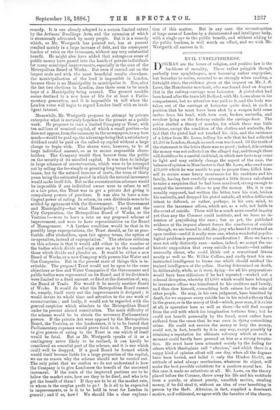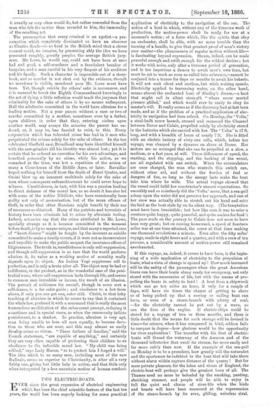EVIL UNSELFISHNESS.
DOGMAS are the bones of religion, and positive law is the backbone of morality. Those rather priggish though perfectly true apophthegms, now becoming rather unpopular, but hereafter to revive, recurred to us strongly when reading, a fortnight since, the evidence given at the inquest on Mr. J. S. Lowe, the Manchester merchant, who was found dead on August 21st in the railway-carriage near Leicester. A pistol-shot had been heard after the train left Bedford, with Mr. Lowe alone in his compartment, but no attention was paid to it, and the body was taken out of the carriage at Leicester quite dead, in such a position that he must have been shot by a weapon held some inches from his head, with torn coat, broken umbrella, and revolver lying on the footway outside the carriage-door. The police started a theory of murder, for which there was little evidence, except the condition of the clothes and umbrella, the fact that the pistol had not touched his skin, and the existence of a letter from Mr. Lowe, telling his wife that he bad collected £1,200 in London, though no such sum was found. Of the truth of the statement in the letter there was no proof ; indeed, it is certain the money was not collected on the alleged day, and though there will doubtless be a careful civil trial, in which new facts may come to light and may entirely change the aspect of the case, the balance of opinion in Manchester is that Mr. Lowe, who owed some £11,000 which he was unable to pay in proper time, killed him- self to secure some heavy insurances for his creditors and his family, having first carefully arranged a little drama calculated to raise a suspicion that he had been murdered, strong enough to compel the insurance offices to pay the money. He, it is rea- sonably supposed, had written the letter, torn his coat, broken his umbrella, and dropped his pistol outside, all with a deliberate intent to defraud, or rather, perhaps, in his own mind, to coerce the insurance offices, which are, as a rule, not liable in the event of suicide. There will be a much more careful inquiry yet than any the Coroner could institute, and we have no in- tention of prejudicing the case ; but as yet, the published evidence at the inquest almost forces the conclusion of suicide —though, we are bound to add, the jury who heard it returned an open verdict—and if it really were one, what a wonderful psycho- logical problem is presented for consideration ? Here we have a man not only distinctly sane—unless, indeed, we accept the un- historic supposition that every suicide is a lunatic—but rather unusually clever, who could think out a sensational drama nearly as well as Mr. Wilkie Collins, and coolly trust his un- instructed intelligence to frame one which should mislead the trained intelligence of the police. Having determined on death, he deliberately, while, as it were, dying—for all his preparations would have been ridiculous if he had repented—workel out a colossal deception, whereby £14,000 which would have belonged to insurance offices was transferred to his creditors and family, and then slew himself, committing both crimes for the sake of other people. He may, in his own judgment, have benefited by death, for we suppose every suicide has in his mind a theory that in the grave, or in the mercy of God—which, poor man, if it exists at all, is operative here as well as there—he will find escape from the evil with which his imagination tortures him ; but he could not benefit personally by the fraud, must rather have suffered from the sense that he was even in dying committing crime. He could not receive the money or keep the money, could not, in fact, benefit by it in any way, except possibly by retaining a reputation for ultimate solvency which at such a moment could hardly have pressed on him as a strong tempta- tion. He must have been actuated mainly by the feeling for others which theologians call "altruism," and which there is a soppy kind of opinion afloat will one day, when all the dogmas have been buried, and belief is only the Hindoo bhakli, an attitude of mind always meritorious, whatever its object, will make the best possible substitute for a positive moral law. In this case it made no substitute at all. Mr. Lowe, on the theory placed before the Coroner, threw away his life and his rectitude from a purely, or almost purely, unselfish motive, stealing money, if he did steal it, without an idea of ever benefiting in person by the theft. Altruism, in fact, supplied a dominant motive, as if cultivated, we agree with the fanatics of the theory,
it usually or very often would do, but rather concealed from the man who felt the motive than revealed to him, the immorality of thexesulting act.
The presumption that every criminal is an egotist—a pre- sumption which completely dominated so keen an observer as Charles Reade—is so fixed in the British mind that a clever counsel could, we imagine, by presenting ably the idea we have presented roughly, greatly perplex the average British jury- man. Mr. Lowe, he would say, could not have been at once .bad and good, a self-murderer and a fraudulent breaker of bargains, and a man careful in his very despair of his creditors and his family. Such a character is impossible out of a story- book, and as murder is not shut out by the evidence, though no murderer is visible, murdered poor Mr. Lowe must have been. Yet, though suicide for others' sake is uncommon, and it is unusual to break the Eighth Commandment knowingly in the act of dying, a little reflection would teach the jurymen that criminality for the sake of others is by no means unfrequent. Half the adulteries committed in the world have altruism for a leading motive. Not a year passes without a case or two of murder committed by a mother, sometimes even by a father, upon children in order that they, entering sinless upon another world, may escape the miseries the parent has en- dured, or, it may be, has fancied to exist, in this. Every corporation which has tolerated crime has had in it men who perpetrated the crimes solely for the sake of others. In the too celebrated Sheffield case, Broadhead may have identified himself with the saw-grinders till his identity was almost lost ; yet it is certain that he ordered no execution for his own advantage, and benefited personally by no crime, while his action, as we remarked at the time, was but a repetition of the action of many a Churchman of the Middle Ages, or later. Ravaillac hoped nothing for himself from the death of Henri Quatre, and Orsini blew up an innocent multitude solely for the sake of men whose consequent enfranchisement he could never hope to witness. Unselfishness, in fact, with him was a passion leading to direct defiance of the moral law, as no doubt it has also led with some of the nobler Nihilists, who have occasionally been guilty not enly of assassination, but of the mean offence of theft, in order that other Russians might benefit by their use of resources so obtained. Many of the patriots and terrorists of history have been criminals led to crime by altruistic feeling. Indeed, actuaries say that the crime attributed to Mr. Lowe, specially strange as it is because committed in the moment before death, is by no means unique, and that many a reported ease of " heart-disease " might be fought by the insurers as suicide committed to make a family secure, if it were not so inconvenient and impolitic to make the public suspect the insurance offices of litigiousness. The truth is, unselfishness is only self-suppression, and though self-suppression is so rare that the world perforce admires it, its value as a working motive of morality really depends upon its object. An Indian Yogi suppresses self to perfection, and is only a brute after all. The object may be bad or indifferent, or the product, as in the wonderful case of the peni- tential nuns, whose self-suppression lasts through life, and seems to common men incredible or insane, the result of an illusion. The pursuit of nobleness for oneself, though in some sort a selfishness, is a far safer guide ; and obedience to a law from above, if only you can get one, safer still. Christ, in that lofty teaching of altruism in which he seems to say that it contained the whole law, prefaced it with a command that is really the most tremendous modification of the subsequent precept, reducing it sometimes and in special cases, as when the community inflicts punishment, to a shadow. In practice, altruism is very apt, man being unable to love all men equally, to become devo- tion to those who are near, and this may almost as easily develop crime as virtue. "These fathers of families," said the French statesman, "are capable of anything," and certainly they are very often capable of preferring their children to an obedience to the inflexible moral law. "My child was being robbed," says Lady Mason, "so to protect him I forged a will." The idea which to so many men, including most of the new Radicals, seems so superior to Chiistianity, is after all a very flabby one, giving but little help in action, and that little only when interpreted by a less uncertain motive of human conduct.



































 Previous page
Previous page